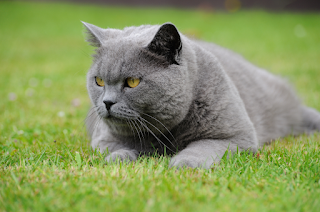Cats come in a wide range of hues and patterns, but blue jumps out. Due to their distinctive and eye-catching look, blue cats are a preferred option among cat owners. The genetics, traits, and grooming requirements of blue cats will all be covered in this article.
Blue cat genetics
There is no
distinct breed of cat for blue cats, often called grey cats. Instead, a genetic
mutation that alters pigment synthesis is what gives the blue color. In
particular, eumelanin, a black pigment that has been diluted, gives the hair of
blue cats a bluish-gray hue.
The dilute
gene, sometimes known as the D gene, is the gene that gives blue its color. One
or two copies of the dominant D gene, one copy of the dominant D gene and one
copy of the recessive d gene, or two copies of the recessive d gene are all
possible in cats. Cats with two copies of the recessive D gene will have a color
that is non-diluted, like black, but cats with two copies of the dominant D
gene would have a color that is diluted, like blue.
The traits of blue cats
There are many
different breeds of blue cats, and each has its distinct traits. Some of the
most well-known breeds that come in blue include the following:
Russian
Blue: The medium-sized cat breed known as the Russian Blue has a silky, thick
coat that is a vivid, glittering blue. They are a popular option among cat
owners because of their devoted and loving nature.
Chartreux cat
The muscular
Blue-Gray Chartreux cat breed stands out for its dense, woolly, blue-gray coat.
They are excellent companions for individuals who seek a tranquil and laid-back
companion because of their reputation for being quiet and reclusive.
British
Shorthair
Blue is one
of the many colors that may be seen in the thick, luxurious coat of the giant
cat breed known as the British Shorthair. They are excellent family pets and
are renowned for their amiable and laid-back personalities.
The small
cat breed known as the Korat has a striking blue-gray coat with a silver shine.
They are a favorite among cat lovers because of their high intelligence and
playful attitude.
Blue Cats' Needs for Grooming
Although
blue cats come in many different breeds, they all require a comparable level of
maintenance. Here are some pointers for keeping your blue cat in top physical
and mental condition:
Regularly
brush your cat's fur: Blue cats have thick coats that, if neglected, can mat
and tangle. Any tangles or knots can be carefully removed with a soft-bristled
brush.
Blue cats'
strong claws have the potential to rip up carpeting and furnishings. To avoid
harm and protect their nails from becoming too long, they should have frequent
nail trims.
Clean your
blue cat's ears frequently since they are delicate and prone to infection. To
clear out any dirt or debris, gently clean your ears.
Give them a
balanced diet; blue cats need one to maintain their health and general
well-being. Make sure to feed them high-quality cat food that is nutrient-dense
and high in protein.
Conclusion
A
distinctive and eye-catching addition to any home is blue cats. They exist in
several breeds, each with particular traits and maintenance requirements. You
may give blue cats the attention and care they require to thrive if you are
aware of their genetics, traits, and grooming requirements. A blue cat is
certain to make your life happier and more companionable, whether you are a
seasoned cat owner or a novice.
Blue cats
require routine veterinary checkups in addition to routine grooming. Like other
cats, they are prone to a number of health conditions, such as dental disease,
urethritis, and obesity. Vaccinations and routine checkups can help keep your
blue cat healthy and content.
It's crucial
to give your blue cat a lot of mental and physical stimulation. They are innate
predators, much like other cats, and require chances to play and explore. To
keep them entertained and active, surround them with a variety of toys,
scratching posts, and climbing frames.
Socialization
is a crucial part of caring for a blue cat. Even while some cats are more
independent than others, all cats may benefit from socialization and
interaction with people. To deepen your connection and establish trust, spend
time playing, chatting, and caressing your cat.
In summary, blue cats are a distinctive and lovely addition to any home. Whether you go with a Russian Blue, Chartreux, British Shorthair, Korat, or another breed, your blue cat will thrive if you provide them the right grooming, diet, exercise, and socialization. Blue kittens will brighten your life and make you smile with their striking looks and loving attitudes.


















.png)
0 Comments